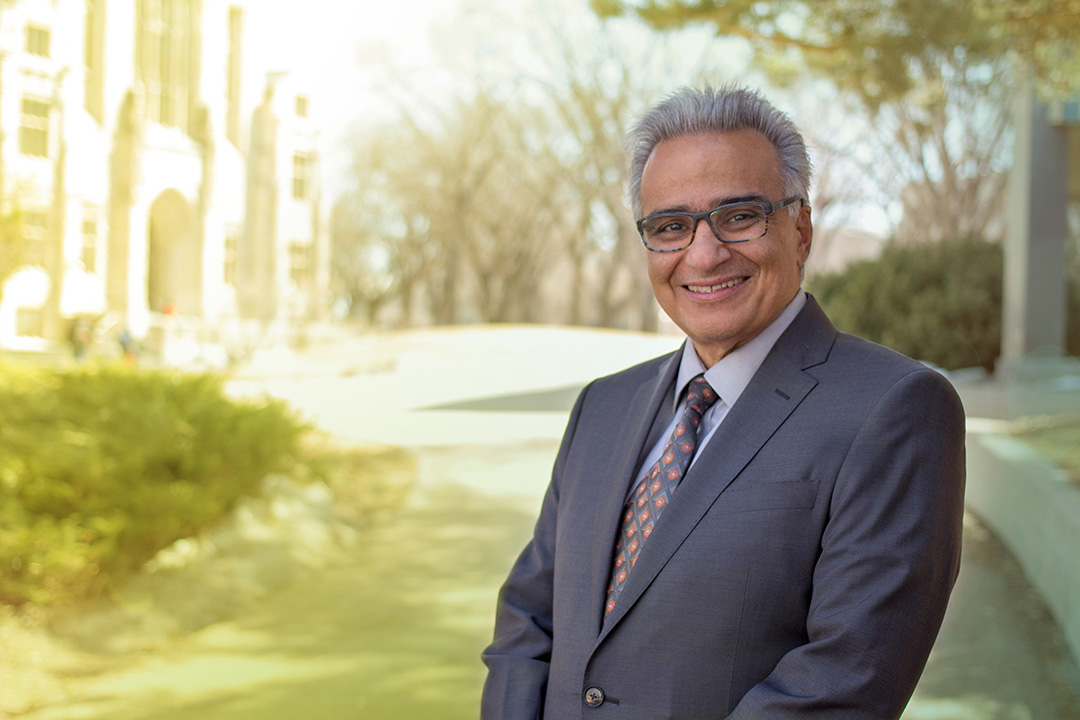
Mastering the art of teaching
The university is paying tribute to Joe Garcea for three decades of dedication and exemplary service to students. But if you ask Garcea, he is the one who is truly grateful.
By James ShewagaHonoured with the Master Teacher Award at Spring Convocation—the highest teaching honour at the U of S and presented to only two faculty members each year—Garcea is also celebrating 37 years of marriage with his wife Laurie (who holds a master’s in education psychology and special education from the U of S), as well as 31 years of educating and mentoring political studies students at the university, where he has proudly watched his own children Giustino, Michele and Maria excel in their courses.
For Garcea, who has battled health issues for years since being diagnosed with stomach cancer in 1991, there is plenty to be thankful for.
“It puts things into perspective, that’s for sure,” said Garcea, a professor in the College of Arts and Science. “I had two related things, cancer and heart valve replacements, and in both cases leading-edge university research changed my life and I consider myself lucky to be alive because of medical science research. One innovative experimental procedure that kept me alive was used at the University of Alberta, at the Mazankowski Alberta Heart Institute, and the other was an innovative procedure involving nanospheres and nuclear isotopes used here at Royal University Hospital.”
Garcea said those life-saving procedures are daily reminders of the value of university research in medical science, as well as in other fields.
“You realize that every day is precious and there are certain things that you can’t put off,” he said. “You realize how important it is to cherish your time with your family, but at the same time you also want to make a contribution to society and to the institution, because that’s all what makes life worth living.”
Garcea has spent more than half his life on campus, but still starts each semester with the same feelings he had in his first year at the U of S back in 1987.
“I get just as excited, and just as nervous, especially at the start of a term when you are just getting to know the new student group and you don’t know quite what hand the gods have dealt you in that particular class,” he said, with a chuckle. “So, until you get a feel for the class, there is a bit of anxiety because in order to be effective, you have to know your student group and at the start you don’t, so you don’t know how to be effective.
“But for me, the most rewarding aspect of teaching today, as it was at the start, is engaging and enlightening students. The greatest thing about teaching is watching the lights go on for these students and there is suddenly complete silence, when you really know that you have them thinking.”
Over his time here, Garcea has become a pillar of the political studies department on campus and a committed contributor to the community in civic governance issues, provincial task forces and federal studies, as well as being much in demand as a media commentator, particularly during election cycles.
“I feel honoured to have been given the opportunity to contribute to those kinds of things, those initiatives aimed at advancing the public good and the public interest,” said Garcea, who was born in Italy and raised in Jasper, Alta. “We are here to educate, but we are also here to make a contribution to our communities. And that is why it is a privilege to be in a place like this university. We have to keep in mind that we are trying to produce mindful and productive citizens. And for me, that’s the mission of this job.”
Garcea has watched the campus and student body change significantly in the past three decades. While much progress has been made, he believes the university needs to continue to focus on doing more to support students.
“I think we have a much more diverse group that needs different things than they did 30 years ago, and that includes more students facing physical and mental health challenges today and more diversity in terms of learning styles,” he said. “It also includes an increasing number of international students and increasing number of Indigenous students, and students from all socio-economic strata. I think we have to continue to make the educational experience a positive one for all our students.”
Garcea’s body of work confirms that he has done precisely that. Former students have gone on to prominence as provincial and national public officials, urban planners and academic leaders, with many crediting Garcea’s guidance in playing a pivotal role in their career pursuits.
His efforts have earned him multiple distinctions, from the College of Arts and Science Teaching Excellence Award, the Provost’s Award for Outstanding Teaching, the U of S Award for Distinction in Outreach and Public Service, and the James Pooler Award for contributions to regional and urban planning. The Master Teacher Award is just the latest in his long list of accolades.
“It’s a great honour,” said Garcea, who earned a bachelor’s at the University of Victoria and master’s degrees in political science and public administration at the University of Manitoba as well as a PhD in political science at Carleton University, prior to coming to the
U of S. “I’m humbled because I know there are a lot of great teachers out there making great efforts, with a great commitment to the teaching profession. So, I feel like I have won, essentially, a lottery. And I just feel that others equally, and others even more worthy, are out there. So, it’s humbling.”

